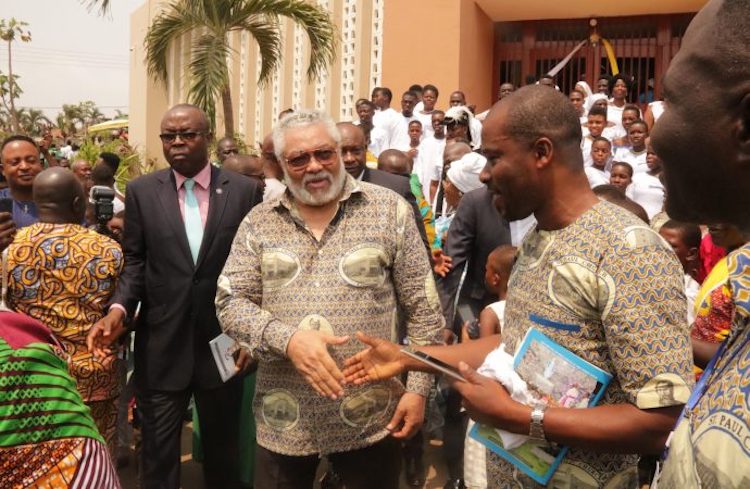By Lisa Vives, Global Information Network
NEW YORK (IDN) – “A bear of a man with a booming voice.” That’s how some will remember Ghana’s former President Jerry John Rawlings who died November 12 in the Korle Bu Teaching Hospital, according to local media reports. He was 73.
“A great tree has fallen and Ghana is poorer for this loss,” said Ghana’s current president, Nana Akufo-Addo. Ongoing campaigns for the December 7 general elections were suspended in recognition of the former leader.
Born in Accra on June 22, 1947, to Scottish pharmacist James Ramsay John and Ghanaian mother Victoria Agbotui, Rawlings attended Achimota School in Accra, Ghana in 1966 and enlisted in the Ghana Air Force in August of 1967.
Upon graduation in 1969, he won the “Speed Bird Trophy” for best cadet in flying and airmanship. In 1977 Rawlings married his childhood sweetheart Nana Konadu Agyeman, with whom he had four children.
Rawlings ruled Ghana for years and reportedly changed her fortunes, wrote Nigerian entrepreneur Chiechefulam Ikebuiro, one of many who left their condolences on Twitter. “I adored Jerry Rawlings while growing up. At a very young age, I heard how he did everything within his power to wrestle power from the government as well as curb corruption.”
“Life in Ghana according to him had become unbearable so that he had to overthrow a military dictator and, in a bid to stop corruption, performed what was referred to as the “house-cleaning exercise”.
The first Black sub-Saharan former colony to gain independence, Ghana staggered through two decades of political and economic chaos. Flight Lieutenant Rawlings, after leading a military coup in 1979, launched a long political career beginning harshly with the execution of former heads of state and several high-ranking officials accused of corruption and profiteering. All were executed by firing squad.
“If people in power use their offices to pursue self-interest, they will be resisted and unseated,” he declared, although later regretting some of the executions.
”I am prepared at this moment to face a firing squad if what I try to do for the second time in my life does not meet the approval of Ghanaians,” he continued, adding that his team would ”clean up corruption by God or the Devil.”
Rawlings had a wide range of alliances including the Free Africa Movement made up of young men who dreamed of a united African continent free of discredited corrupt leaders close to the European colonial governments and western business interests that dominated so much of the postcolonial landscape.
By 1980, with 10 years of military life behind him, Rawlings had become a charismatic and fearless speaker popular among the young soldiers and a militant, impoverished urban working class. He had anti-imperialist foreign policy reminiscent of Ghana’s first president after independence, Kwame Nkrumah.
Cuba’s leadership rekindled the old relationship from the Nkrumah era and offered support, especially in health and education, opening a school in Cuba for Ghanaian children on the Island of Youth, alongside the schools for children from the liberation movements of Angola, Mozambique, Namibia and Ethiopia.
Ghana’s government was close to Angola’s, then under clandestine military assault from Washington allied with apartheid South Africa. Rawlings was also deeply involved with another charismatic military figure, who took power in a coup in 1983 to launch a revolution – Thomas Sankara of Burkina Faso.
After the Cold War, he moved towards multiparty democracy and won two elections.
In 2000 he agreed to step down but continued to play a role in retirement, as an African Union envoy to Somalia, a lecturer at Oxford University and in July 2019 as Chair of the Thomas Sankara Memorial Committee.
“He was God’s gift to the country and l can only ask that God keeps his soul in peace,” a former ally, Maj. Kojo Boakye Gyan was reported to say. [IDN-InDepthNews – 17 November 2020]
Photo: Former Ghanaian leader Jerry John Rawlings, centre, greets people outside St. Paul’s Catholic Church February 2, 2020. Rawlings, a Catholic, died November 12 at age 73 in the nation’s capital, Accra. Credit: Damian Avevor/CNS.


